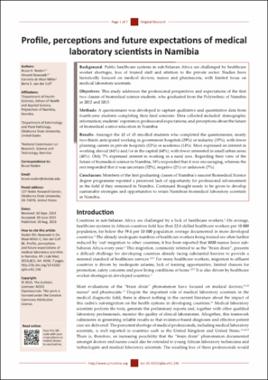| dc.contributor.author | Noden, Bruce H. | |
| dc.contributor.author | Nowaseb, Vincent | |
| dc.contributor.author | de Waal-Miller, Cornelia | |
| dc.contributor.author | van der Colf, Berta E. | |
| dc.date.accessioned | 2022-04-12T13:52:22Z | |
| dc.date.available | 2022-04-12T13:52:22Z | |
| dc.date.issued | 2015-08-20 | |
| dc.identifier | oksd_noden_profileperceptionsandfuture_2015 | |
| dc.identifier.citation | Noden, B. H., Nowaseb, V., de Waal-Miller, C., & van der Colf, B. E. (2015). Profile, perceptions and future expectations of medical laboratory scientists in Namibia. African Journal of Laboratory Medicine, 4(1). https://doi.org/10.4102/ajlm.v4i1.246 | |
| dc.identifier.uri | https://hdl.handle.net/11244/335185 | |
| dc.description.abstract | Background: Public healthcare systems in sub-Saharan Africa are challenged by healthcare worker shortages, loss of trained staff and attrition to the private sector. Studies have historically focused on medical doctors, nurses and pharmacists, with limited focus on medical laboratory scientists. | |
| dc.description.abstract | Objectives: This study addresses the professional perspectives and expectations of the first two classes of biomedical science students, who graduated from the Polytechnic of Namibiain 2012 and 2013. | |
| dc.description.abstract | Methods: A questionnaire was developed to capture qualitative and quantitative data from fourth-year students completing their final semester. Data collected included: demographic information; students' experience; professional expectations; and perceptions about the future of biomedical science education in Namibia. | |
| dc.description.abstract | Results: Amongst the 42 of 45 enrolled students who completed the questionnaire, nearly two-thirds anticipated working in government hospitals (29%) or industry (35%), with fewer planning careers in private hospitals (12%) or academia (14%). Most expressed an interest inworking abroad (64%) and/or in the capital (64%), with fewer interested in small urban areas (48%). Only 7% expressed interest in working in a rural area. Regarding their view of the future of biomedical science in Namibia, 38% responded that it was encouraging, whereas therest responded that it was uncertain (52%), negative (2%) or unknown (7%). | |
| dc.description.abstract | Conclusion: Members of the first graduating classes of Namibia's nascent Biomedical Science degree programme reported a perceived lack of opportunity for professional advancement in the field if they remained in Namibia. Continued thought needs to be given to develop sustainable strategies and opportunities to retain Namibian biomedical laboratory scientists in Namibia. | |
| dc.format | application/pdf | |
| dc.language | en_US | |
| dc.publisher | AOSIS | |
| dc.relation.ispartof | African Journal of Laboratory Medicine, 4 (1) | |
| dc.rights | This material has been previously published. In the Oklahoma State University Library's institutional repository this version is made available through the open access principles and the terms of agreement/consent between the author(s) and the publisher. The permission policy on the use, reproduction or distribution of the material falls under fair use for educational, scholarship, and research purposes. Contact Digital Resources and Discovery Services at lib-dls@okstate.edu or 405-744-9161 for further information. | |
| dc.title | Profile, perceptions and future expectations of medical laboratory scientists in Namibia | |
| dc.date.updated | 2022-04-07T14:28:31Z | |
| osu.filename | oksd_noden_profileperceptionsandfuture_2015.pdf | |
| dc.description.peerreview | Peer reviewed | |
| dc.identifier.doi | 10.4102/ajlm.v4i1.246 | |
| dc.description.department | Entomology and Plant Pathology | |
| dc.type.genre | Article | |
| dc.type.material | Text | |
| dc.identifier.author | ORCID: 0000-0002-0096-370X (Noden, Bruce H) | |
| dc.identifier.author | ScopusID: 6601968347 (Noden, Bruce H) | |
